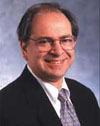Issue Archive
Editor’s Wrapup: Empowerment with Tradition
 While the empowerment of women in the 1970’s seemed to require a firm break with the past, efforts to enrich women’s lives in the 21st century seem just as often to harness tradition.
While the empowerment of women in the 1970’s seemed to require a firm break with the past, efforts to enrich women’s lives in the 21st century seem just as often to harness tradition.
Who would have thought 30 years ago that the same cultural changes that allowed women to enter medical schools in growing numbers would eventually prompt the return of the midwife? As Rahel Musleah reports (page 12), “What may truly be the world’s oldest profession is making a comeback.” From 1990 to 2002, the proportion of American babies born with midwives in attendance doubled.
While the right to express themselves freely is a given for Western women, Irshad Manji gets death threats for speaking her mind. Manji is a Muslim feminist whose book, The Trouble With Islam, has enraged many dogmatic Muslims. But if she seems out on a limb in the Islamic world, Manji’s effort to find support for her views in Muslim history seems very much in tune with the trend to link tradition and empowerment. Charley J. Levine’s interview with Manji begins on page 26.
Power is not just something women demand as adults. There is a growing movement, encompassing school initiatives and parenting techniques, to enhance the self-image of girls. Amy Blumenfeld reports (page 8) on several programs designed to raise great Jewish girls.
Ruth Mason was often struck by the tranquillity of Ethiopians in Israel, but she gained new insight into culture and tradition when she attended a coffee ceremony—an hour-long ritual of washing, roasting and grinding beans before brewing them—in Ethiopia. “Perhaps growing up in a society in which a whole hour is devoted to making coffee,” she writes, “instilled in them an inner bliss, the ability to be fully in the moment, something we all strive for with our meditation practices and our yoga classes.” Mason’s caffeine interlude appears on page 23.
Maybe moving forward requires not a break with tradition, but a coffee break with it. —Alan M. Tigay










 Facebook
Facebook Instagram
Instagram Twitter
Twitter
Leave a Reply